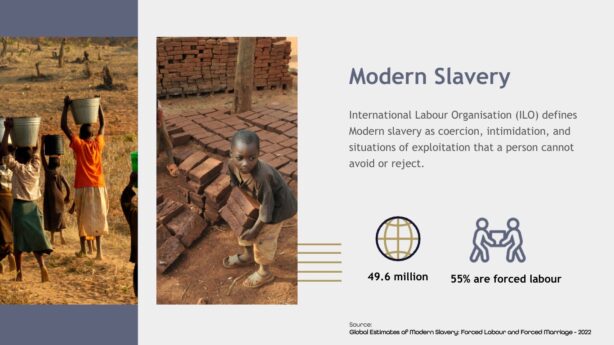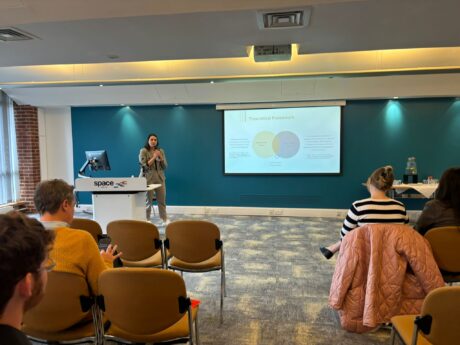Highlighting Real Impact: Tackling Modern Slavery Through Innovative DBA Research
Slavery can often be thought of as a problem of the past—but it’s a hidden reality embedded in the products we use every day, from the clothes we wear to the food we eat. An estimated 50 million people are trapped in modern slavery worldwide, many of them working in supply chains that power global businesses. While companies increasingly release statements about ethical sourcing and corporate responsibility, the gap between what’s reported and what actually happens on the ground is often wide. So, how can we hold businesses accountable? How do we separate genuine efforts from box-ticking exercises?
These are the questions driving Talita Meira’s research. With a background in helping companies comply with modern slavery laws and now pursuing a Doctorate in Business Administration (DBA) at Hult, she brings practical insight and a research-driven perspective to a complex issue. Her work explores not just what companies say but what they do—and whether they are making any difference.
We sat down with Talita to explore the roots of modern slavery, how it persists in global supply chains, and what can be done to stop it.
Hult: What is modern slavery, how is it connected with global supply chains, and why does it need to be tackled?
Talita: Modern slavery includes extreme forms of exploitation like forced labor, human trafficking, and debt bondage—situations where people are unable to leave or refuse work due to coercion, deception, or threats. Despite being legally abolished, modern slavery is still a widespread issue. The International Labour Organization (2022) estimates that 49.6 million people are trapped in modern slavery, with 27.6 million in forced labor across sectors such as manufacturing, construction, mining, and agriculture.
Global supply chains are particularly vulnerable to this kind of exploitation. Many companies depend on complex, multi-layered supplier networks, often involving subcontracting and outsourcing. These layers can be hard to track, especially in countries with weak labor protections, making it easier for abuse to go unnoticed.
It’s crucial to address modern slavery not just for ethical reasons, because it violates basic human rights, but also for business sustainability. Companies risk legal penalties and serious reputational damage if authorities find them complicit. Legislation like the UK Modern Slavery Act (2015) and the Australian Modern Slavery Act (2018) has pushed corporations to disclose how they manage slavery risks. But research shows disclosure alone isn’t enough. Without transparency, stakeholder engagement, and genuine accountability, these issues persist.
“An estimated 50 million people are trapped in modern slavery worldwide.”
H: What are the issues you are looking at in your DBA, and how could your findings help improve the situation?
T: My research focuses on modern slavery reporting quality and supply chain transparency, examining how companies disclose and act on modern slavery risks. Specifically, my work investigates how companies engage stakeholders such as NGOs, investors, and labor organizations, and whether this engagement truly influences corporate anti-slavery efforts. I also look at the transparency and traceability of corporate supply chains, pinpointing vulnerabilities that allow modern slavery to persist. My work also looks at the effectiveness of corporate modern slavery reports, identifying gaps between stated policies and real-world outcomes.
The findings from my research can help improve modern slavery governance by providing data-driven insights into which corporate practices are effective and where companies fall short. By identifying gaps between policy and practice, this research can guide businesses, policymakers, and advocacy groups in pushing for stronger accountability mechanisms.
“The goal is to offer data-driven insights that help businesses, regulators, and advocacy groups push for meaningful change, not just tick-box compliance.”

H: How have you found the experience of moving from being a practitioner on modern slavery issues to an academic researcher?
T: The transition from practitioner to academic researcher has been both insightful and challenging. While working as a Senior Supply Chain Consultant at Unchained Solutions, I led hands-on, impact-driven initiatives, including risk assessments, supplier engagement, and developing compliance strategies to help Australian organizations meet the Modern Slavery Act (2018) requirements. I worked directly with businesses, conducting supply chain mapping, gap analyses, and risk evaluations to enhance transparency and ethical sourcing.
Moving into academia required a shift from solution-driven action to theoretical exploration and empirical research. Instead of directly implementing strategies, I now focus on analyzing and assessing their effectiveness.
My practical experience, however, provides a strong foundation for my research, ensuring that my work remains relevant to policymakers, corporations, and advocacy groups. This transition has also highlighted the critical gap between corporate reporting and actual impact, which is a key area I’m addressing in my research.


H: How have you found the experience of taking your work to academic conferences and discussing it with academic peers?
T: Engaging with academics at conferences has been a valuable and thought-provoking experience. At Unchained Solutions, I worked closely with businesses to interpret regulatory requirements, develop training materials, and create practical risk assessment tools.
Presenting at conferences like the Modern Slavery Conference that Hult co-hosted with the University of Sussex and the IOEM Conference, where I won an award, allowed me to connect this practical expertise with academic discourse, bridging the gap between research and real-world application.
One challenge has been navigating different disciplinary perspectives. While my background in corporate compliance and supply chain risk management focuses on pragmatic solutions, many academic discussions emphasize theoretical frameworks and long-term systemic change. However, this exchange of ideas has strengthened my research by integrating both practical and theoretical insights, ensuring that my work contributes to both academic knowledge and actionable change in supply chains.
“Presenting my findings at prestigious academic conferences and receiving an award was an incredibly fulfilling experience.”
Talita’s research not only advances academic discourse but also provides actionable insights that businesses, policymakers, and advocacy groups can put to use immediately. The DBA program at Hult fosters precisely this kind of impactful research—equipping professionals like Talita to drive meaningful change on critical global issues like modern slavery.


